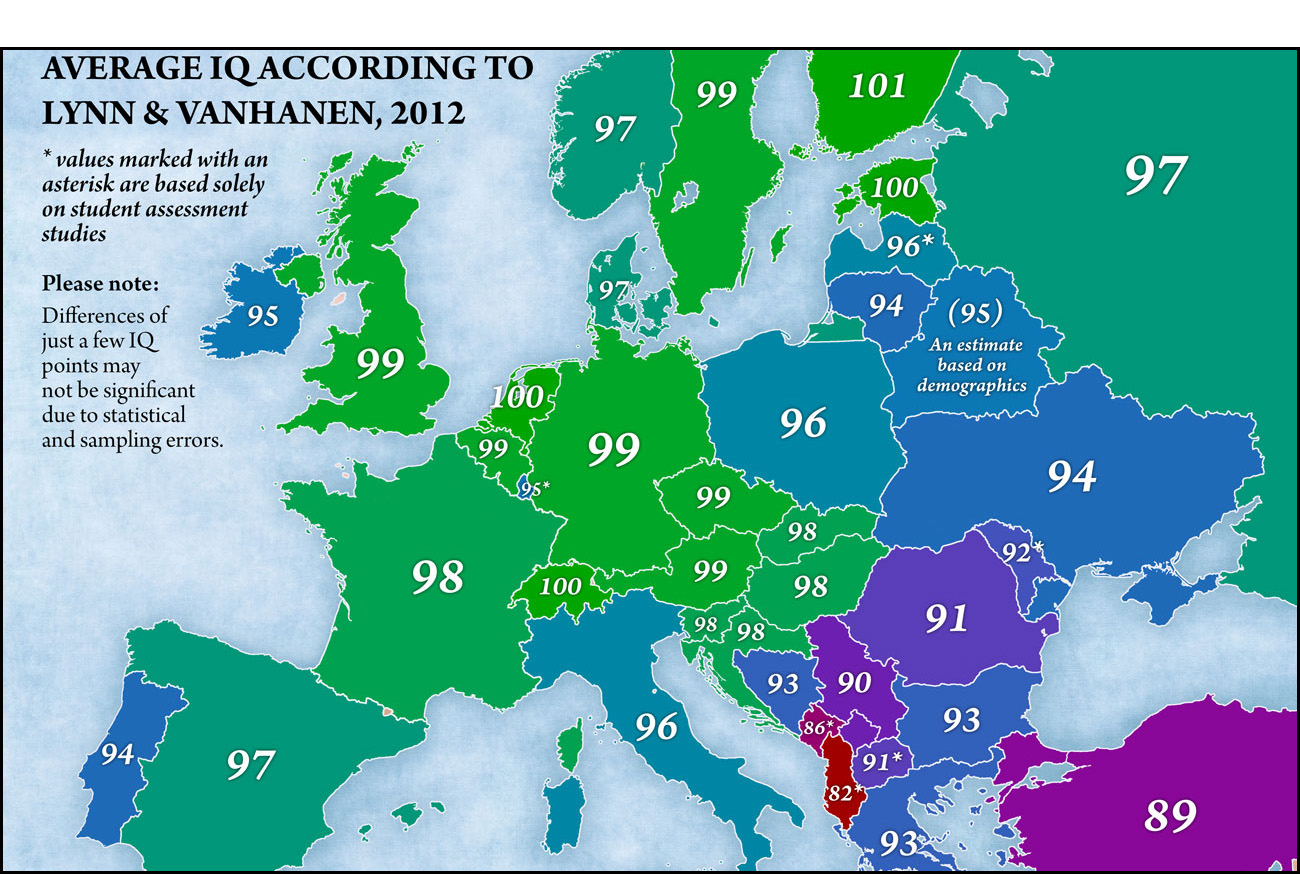
A reader emails me:
Twice now you have asserted that your “… read of the evidence is that the black-white IQ gap is almost certainly accounted for by environmental factors.” Would you please do me the favor of listing (in either a reply email or in Mother Jones) one or two of the sources for your conclusion so that I too may read them. Thank you.
I’m a little reluctant to do this. Partly it’s because I got bored with this argument years ago. The other is that I really don’t need a big pile of angry tweets and emails from the IQ truthers. Still, I’ll bet this is a common question that a lot of people are too diffident to ask about. So I’ll do it.
Two warnings before I start. First, the evidence isn’t bulletproof on either side. It just isn’t, and I’m afraid we have to put up with that uncertainty until neurobiologists figure out where intelligence really comes from. Second, I’m not trying to prove my side of the argument here. That’s not possible. I merely want to make a few points that should allow you to see that there’s plenty of reason to believe that genes probably aren’t responsible for IQ differences between racial groups.¹ Here goes:
First off, there is a black-white gap in IQ scores.² Nobody thinks otherwise. Nor is it likely that this is due to test bias or other test construction issues. The gap really does exist. The only question is: what causes it? Is it possible that it’s due entirely to genetic differences between blacks of African ancestry and whites of European ancestry? I doubt it for these reasons:
- Modern humans migrated into Europe about 40,000 years ago. That’s a very short time for selection pressures to produce a significant increase in a complex trait like intelligence, which we know to be controlled by hundreds of different genes. Even 100,000 years is a short time. It’s not impossible to see substantial genetic changes that fast, but it’s unlikely.
- Speaking very generally, recent research suggests that the heritability of intelligence is about two-thirds biological and one-third environmental. That amount of environmental influence is more than enough to account for the black-white IQ gap.
- There’s a famous result in intelligence studies called the Flynn Effect. What it tells us is that average IQs rose about 3 points per decade throughout the 20th century. That’s roughly 20 points of IQ throughout the entire period, and it’s obvious that this couldn’t have been caused by genes.³ It’s 100 percent environmental. This is clear evidence that environmental factors are quite powerful and can easily account for very large IQ differences over a very short period of time.
- The difference in average IQ recorded in different European countries is large: on the order of 10 points or more. The genetic background of all these countries is nearly identical, which means, again, that something related to culture, environment, and education is having a large effect.

- It is very common for marginalized groups to have low scores on IQ tests. In the early years of the 20th century, for example, the recorded IQs of Italian-Americans, Irish-Americans, Polish-Americans and so forth were very low. This was the case even for IQ scores recorded from the children of immigrants, all of whom were born and educated in the US and were fluent English speakers. These IQ scores weren’t low because of test discrimination (at least not primarily because of that), they were low because marginalized groups often internalize the idea that they aren’t intelligent. However, over the decades, as these groups became accepted as “white,” their IQ scores rose to the average for white Americans.
- The same thing has happened elsewhere. In the middle part of the 20th century, the Irish famously had average IQ scores that were similar to those of American blacks—despite the fact that they’re genetically barely distinguishable from the British. However, as Ireland became richer and the Irish themselves became less marginalized, their IQ scores rose. Today their scores are pretty average.
- In 1959, Klaus Eyferth performed a study of children in Germany whose fathers had been part of the occupation forces. Some had white fathers and some had black fathers. The IQ scores of the white children and the racially mixed children was virtually identical.
- Over the past few decades, the black-white IQ gap has narrowed. Roughly speaking, it was about 15 points in 1970 and it’s about 10 points now. This obviously has nothing to do with genes.
I hope this makes sense. You can draw your own conclusions, but my take from all this is that (a) the short time since humans migrated to Europe doesn’t allow much scope for big genetic changes between Africans and Europeans, (b) it’s clear that environment can have a very large effect on IQ scores, and (c) anyone who thinks the marginalization of African Americans isn’t a big enough effect to account for 10-15 points of IQ is crazy. There are counterarguments to all my points, and none of this “proves” that there can’t possibly be genetic differences between blacks and whites that express themselves in noticeable differences in cognitive abilities. But I sure think it’s very unlikely.
¹Nor am I addressing the issue of whether race is socially constructed. There’s enough to talk about already without getting into that.
²In this post, I’m using IQ and “intelligence” interchangeably. Most intelligence researchers believe that IQ scores are a pretty good measure of the cognitive ability that we commonly call intelligence.
³Nothing that changes over a period of decades or centuries can be caused by changes in genes. At a minimum, it takes thousands of years for genetic changes to spread throughout a population.















